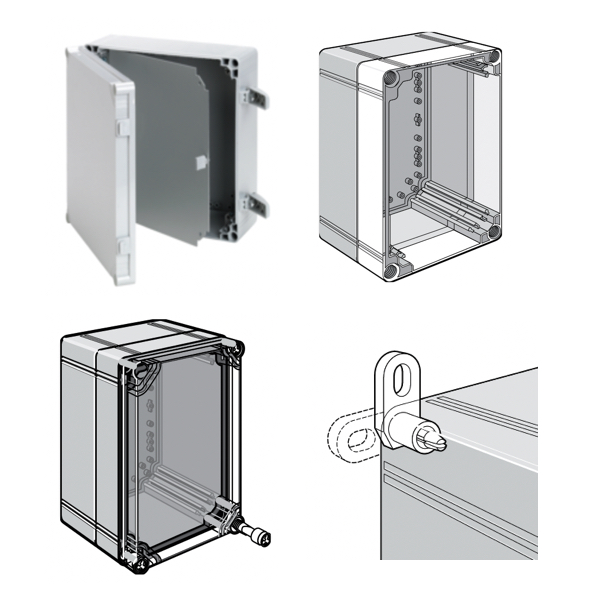QLINE Enclosure Accessories

QLINE enclosure accessories are designed to expand the functionality and installation flexibility of nVent Hoffman QLINE non-metallic enclosures. This category includes backplates, extension rings, adjustable-depth swing-out panels, hinge kits, screw kits, depth fittings, and wall-mounting brackets used with QLINE ABS and polycarbonate wall-mount enclosures. These accessories support efficient equipment mounting while maintaining enclosure integrity in industrial and corrosive environments.
QLINE ABS and polycarbonate enclosures feature molded, impact-resistant bodies with opaque or clear covers and internal mounting pads for optional rails, panels, and components. The non-metallic materials are easily modified by drilling, punching, filing, or sawing, allowing customization for control systems, instrumentation, and electrical components. QLINE I enclosures are designed for larger controls requiring frequent access, while QLINE D enclosures provide dependable protection in corrosive environments and can withstand occasional submersion.
Accessory options, such as adjustable-depth aluminum swing-out panels, allow instruments and controls to be positioned close to the enclosure opening for improved accessibility. Extension rings add nearly two inches of internal depth, while depth fittings enable full front-to-back panel adjustment. Hinge kits, screw kits, and mounting brackets are engineered specifically for QLINE enclosure compatibility, helping ensure secure installation and long-term performance.
FAQs
Q: What types of accessories are available for QLINE enclosures?
QLINE accessories include backplates, extension rings, swing-out panels, depth fittings, hinge kits, screw kits, and wall-mounting brackets designed to increase mounting capacity and installation flexibility.
Q: What materials are QLINE enclosures made from?
QLINE enclosures are made from ABS or polycarbonate materials, both of which offer high impact resistance, excellent electrical insulation properties, and strong resistance to moisture and chemicals.
Q: What is the purpose of a QLINE extension ring?
An extension ring increases the internal depth of a QLINE enclosure by approximately 1.97 inches, allowing additional clearance for components and wiring.
Q: Are QLINE enclosures suitable for corrosive environments?
Yes, QLINE I and QLINE D enclosures are designed for corrosive environments. QLINE D enclosures can also withstand occasional submersion.
Q: Can components be grounded to non-metallic QLINE enclosures?
No, non-metallic enclosures are non-conductive, so components cannot be grounded to the enclosure itself. However, they still provide strong physical security and tamper resistance when properly installed and locked.
Why Buy QLINE Enclosure Accessories from RSP Supply
RSP Supply provides a comprehensive selection of QLINE enclosure accessories to support ABS and polycarbonate enclosure installations across industrial, commercial, and corrosive environments. Our offerings include manufacturer-approved components designed for proper fit and performance with QLINE enclosures. Customers choose RSP Supply for dependable product availability, technical expertise, and industrial-grade solutions that help streamline enclosure configuration and system integration.

